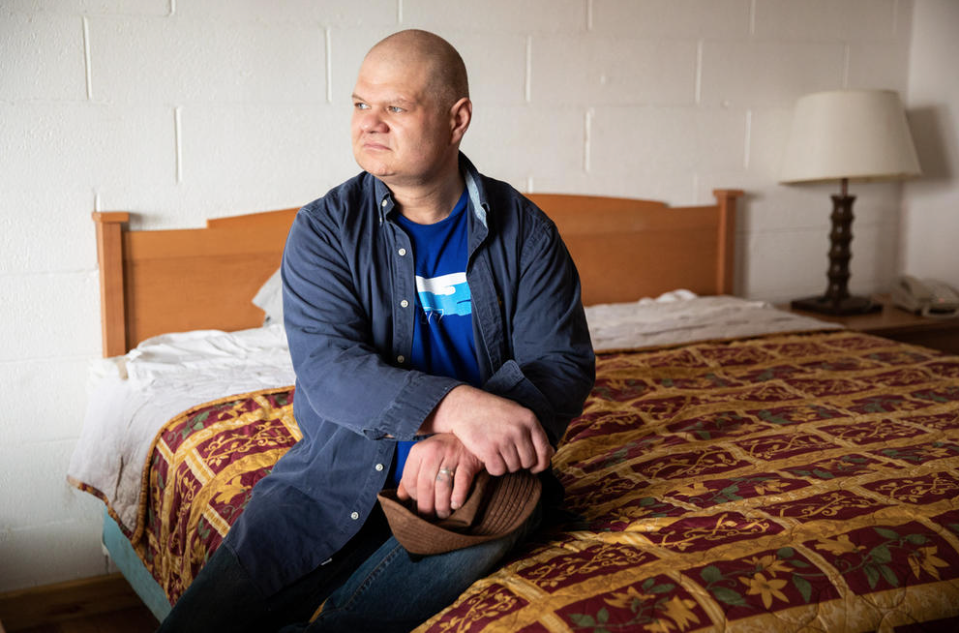Legally and ethically, prosecutors are required to turn over evidence — even when it could hurt their case. Those who don’t, however, face few consequences.
||| FROM CROSSCUT.COM ||| Reprint at request of Orcasonian reader
Jason Young said he was just along for the ride when two of his friends took some bicycles and stashed them in the back of a truck. Security camera footage backs up Young’s story; in the video, Young is never seen touching the bikes. Yet a San Juan County Sheriff’s deputy said differently in a sworn statement, writing that the video did, in fact, show Young stealing bikes from a rack. Based on that probable cause statement — which the deputy later said was inaccurate — Young was charged with theft.
What Young and his attorney didn’t know at the time was that the deputy who testified about the alleged bicycle theft, Doug Maya, had “a long-documented history of report writing issues” and a “long history of unsatisfactory work performance,” according to his supervisors.
But that information arguably shouldn’t have been a secret. Like all prosecutors, the one who charged Young with theft was legally and ethically obligated to share evidence that could cast doubt on the deputy’s testimony, as well as other information that could hurt the state’s case and help exonerate Young.
That didn’t happen, Young’s lawyer said, causing Young months of stress and disruption before a jury eventually found him not guilty.
This was not an isolated incident, according to criminal defense attorneys across Washington state.
Defense lawyers say prosecutors regularly compromise defendants’ due process rights by not sharing evidence that could undermine the prosecution’s case, or potentially prove a person’s innocence.
“A lot of defense attorneys, we have to do the prosecutor’s job for them, and find these things out on our own,” said Kimberly La Fronz, a public defender in King County.
Young said that during the two years the theft case dragged on, his business working as a mechanic on San Juan Island dried up, causing him to lose income. He eventually became homeless.
“It is a small community. You get something like that thrown at you, nobody is going to hire you,” Young said last month. “It really crippled me financially.”
Although standards of professional ethics require prosecutors to turn over just about anything that could hurt their case, prosecutors rarely face consequences when they fail to do so, said Kimberly Ambrose, a professor who teaches a course on professional responsibility at the University of Washington School of Law. She said questionable actions by prosecutors hardly ever get reported.
“The ethical obligations are rarely enforced,” Ambrose said. “… I think it just speaks to a profession that isn’t very good at holding itself accountable.”
Justice versus convictions
Last year, Crosscut examined law enforcement officers who land on prosecutors’ lists of police witnesses with credibility issues. Prosecutors keep these lists — commonly known as Brady lists — so they can inform defense attorneys about police officers’ past dishonesty, lapses in judgment, racial bias or other issues that could cast doubt on a cop’s testimony.
Such disclosures are required under past court rulings, including the 1963 case of Brady v. Maryland, as well as ethics rules that apply specifically to prosecutors.
“At the end of the day, the prosecutor’s job is to do justice — it’s not to get a conviction,” said state Sen. Manka Dhingra, D-Redmond, who chairs the Senate Law & Justice Committee and has worked as a King County deputy prosecutor.
Yet there’s no Brady-type list of prosecutors who fail to turn over information that could damage their case.
Defense attorneys say prosecutors fail to share information that is favorable to defendants more often than people realize.
“I would say it has happened enough in my career where I now look for it,” said Ali Hohman, the director of legal services at the Washington Defender Association, which represents public defense attorneys.
At the same time, prosecutors rarely face discipline over such issues. In three recent cases in Snohomish County, judges ruled that deputy prosecutors engaged in misconduct, but none ended up being disciplined by the state bar association.
In other cases Crosscut reviewed, officers were added to county Brady lists only after defense attorneys raised concerns about incidents in a cop’s background. That can be an issue because prosecutors have a duty not only to share information that favors defendants, but to actively seek it out; they also are expected to know everything police know.
Other times, such as with Maya, an officer’s history of performance issues or writing faulty reports wasn’t enough to prompt a prosecutor to add that officer to the county’s Brady list, leaving defense attorneys in the dark about the officer’s past issues.
Robert Bulloch, the lawyer who represented Young in the bicycle theft case, said that even after Maya resigned under pressure shortly before Young’s trial, the San Juan County prosecutor didn’t tell him about Maya’s problems at work. Bulloch said the prosecutor also didn’t share that Maya had once been placed on administrative leave because of citizen complaints, as well as over his history of emotional outbursts and “incomplete investigation.”
After Young’s case ended, Bulloch asked the prosecutor to consider adding Maya to the county’s Brady list, so defense attorneys going forward would know about Maya’s inaccurate statement and his troubled history.
The prosecutor declined, saying such a step wasn’t necessary— mainly because Maya wasn’t found to have intentionally lied.
At the end of the day, the prosecutor’s job is to do justice — it’s not to get a conviction.” — State Sen. Manka Dhingra, D-Redmond, who has worked as a King County deputy prosecutor
Different standards
Prosecutors vary widely in terms of what information they think they are required to share.
Randall Gaylord, the San Juan County prosecutor whose office handled Young’s theft case, said his office informs defense attorneys about officer misconduct if an officer has sustained disciplinary findings of dishonesty or untruthfulness — or, if a judge rules an officer was dishonest.
Because Maya wasn’t sanctioned specifically for lying or making a false statement, Gaylord said the deputy’s history of shoddy report writing, outbursts and poor work performance didn’t need to be disclosed.
“To be subject to disclosure, there should be a finding of dishonesty or falsehood,” Gaylord wrote in an email.
King County, where Seattle is located, has a slightly broader definition of what should land an officer on the Brady list. But a good deal of officer misconduct still doesn’t make the cut.
The King County Prosecuting Attorney’s Office generally puts cops on its Brady list when they have disciplinary findings of dishonesty, biased policing, criminal conduct or pending allegations of the same, said spokesperson Casey McNerthney.
“We are well aware of our obligations, and err on the side of disclosure,” wrote Dan Clark, the head of the criminal division of the King County Prosecuting Attorney’s Office, in an email to Crosscut.
Yet the Washington Association of Prosecuting Attorneys recommends that prosecutors disclose even more.
Prosecutors are obligated to turn over a wide range of information that could cause a jury to second-guess the state’s case; that can include allegations that didn’t lead to findings of misconduct, or behavior for which an officer was never formally disciplined, said Pam Loginsky, the prosecutor association’s staff attorney.
An officer making inaccurate statements under oath or in official reports also should be disclosed, Loginsky said, even if those falsehoods weren’t necessarily intentional.
The same goes for forensic lab failures, conflicting statements from witnesses or issues involving the mishandling of evidence, she added.
Gaylord said another reason he chose not to add Maya to San Juan County’s Brady list is because Maya resigned.
A new state law hinges on prosecutors keeping their Brady lists updated to ensure police agencies can find out whether officers were flagged as having credibility issues in past jobs.
Under the new law, police agencies must ask whether potential new hires are on the Brady list where they previously worked.
Dhingra, the state senator, said that if prosecutors don’t add officers to county Brady lists simply because those officers resigned, it could create a loophole in the new law.
Former officers can also be called on to testify in pending cases, making their disciplinary histories relevant even after they’ve left the force.
Maya, for example, didn’t testify in Young’s trial until 10 months after he resigned.
Maya didn’t respond to messages asking him to comment for this story.That’s because for a judge to rule that a prosecutor broke the rules, defense attorneys need to prove not only that suppressed evidence would have helped a defendant. They also must show that it was enough to undermine confidence in a verdict or change the outcome of a case.
Brandon Bang, director of the Criminal Justice Program at West Texas A&M University, said this standard is a difficult one for defense attorneys to meet.
It also is “a very imprecise standard” because it can vary from case to case, depending on the strength of the rest of the prosecution’s evidence, Bang said.
The same piece of information about a police officer, for instance, could be deemed material in one case where the prosecution’s case is weaker, but not in another case, where the state has more corroborating evidence, said Bang, who wrote his dissertation on prosecutorial misconduct in Washington state.
Because it can be difficult to determine in advance what evidence may later prove important in a trial, the state prosecuting attorneys association recommends that prosecutors turn over all evidence that favors defendants or that could hurt the state’s case.
Ethics rules also set a higher standard for disclosure than what the courts require. Ambrose, the UW law professor, said the state’s rules of professional conduct for lawyers say prosecutors are supposed to turn over anything that is favorable to a defendant.
Dhingra, the state senator who has worked as a King County deputy prosecutor, said that’s the way it should be.
“Case law does not say, ‘If you think it might hurt your case, turn it over.’ But the practice and the training needs to be, ‘If you think it hurts your case, we turn it over,’ because that’s the right thing to do,” Dhingra said.
The ethical obligations are rarely enforced …I think it just speaks to a profession that isn’t very good at holding itself accountable.” — Kimberly Ambrose, University of Washington law professor
Case goes forward despite misconduct
Even when there is a finding of prosecutorial misconduct, consequences for prosecutors are rare.
In Clark County last year, a judge ruled a deputy prosecutor interfered inappropriately by stopping a defense attorney’s attempt to get a crash victim’s medical records.
Yet the deputy prosecutor wasn’t sanctioned by the judge or the state bar association, and the case was allowed to proceed.
Kalama resident Jamie Kerley was charged with vehicular assault in that case. The content of the victim’s medical records was crucial because, to prove a vehicular assault charge, a prosecutor must show that a crash caused “substantial bodily injury.”
During a pretrial interview, the crash victim said Kerley’s lawyer could see his medical records. But the deputy prosecutor stepped in, stopping Kerley’s lawyer from giving the victim a medical release form to sign.
The judge said that interference amounted to prosecutorial misconduct.
Eventually, an expert witness hired by the defense reviewed the victim’s medical records and determined that most of the victims’ ailments — including headaches, neck pain and sexual dysfunction — were things he suffered from before the collision.
The prosecutor later asked the judge to dismiss the case.
**If you are reading theOrcasonian for free, thank your fellow islanders. If you would like to support theOrcasonian CLICK HERE to set your modestly-priced, voluntary subscription. Otherwise, no worries; we’re happy to share with you.**








Prosecutorial misconduct is alive and well in San Juan County. I once spent two days in court defending a Notice of Violation and later I discovered a letter written by a County employee backing up my case. The employee told me he sent this letter to the same Deputy Prosecutor that argued in court against me. When I followed up I was told by this same Deputy Prosecuting Attorney that my file was lost.
I have been told that I should not speak out as I will be subject to further harassment. I have already been subject to that harassment as a second Notice of Violation was served on me and I have had misinformation presented to the Courts by a Deputy Prosecuting Attorney which was contrary to a statement by the Head of Community Development and Planning. All for the sake of prevailing rather than admitting the truth.
San Juan County citizens have a chance to clear the slate and elect a new Prosecuting Attorney this fall. Hopefully a respectable local attorney will step up and commit to the challenge. It is past time for a change. It will be beneficial to all San Juan County citizens if a newly elected Prosecuting Attorney breaks the cycle of preferential treatment of favored persons and coverup of the facts which happens all too frequently when a concerned citizen stands up for what they think is right.